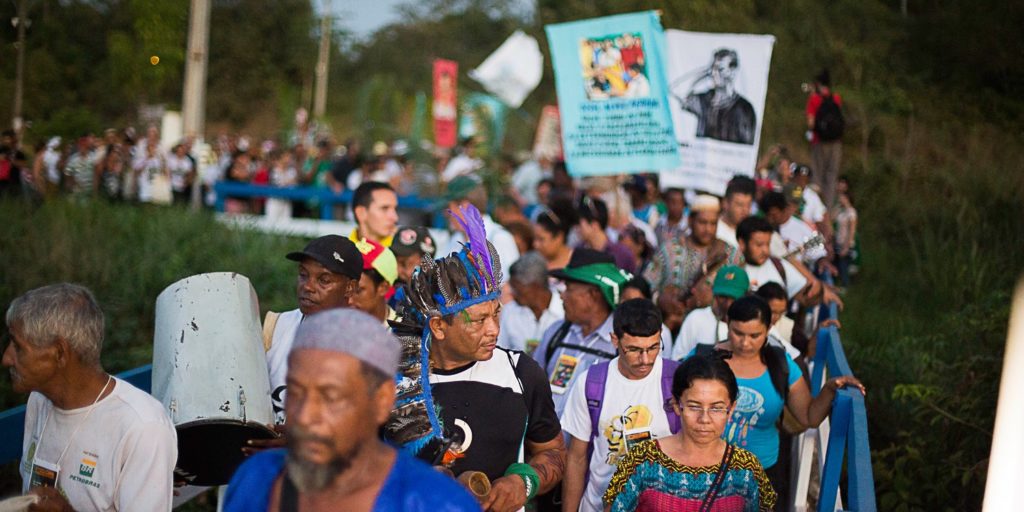“The incumbent Brazilian government has been trying to undermine human rights and environmental achievements… In light of this, Pope Francis’ Synod on the Pan-Amazonian region is of the greatest importance.”
José Batista Afonso is a lawyer working for the Land Pastoral Commission (CPT) of the Marabá Diocese in Pará, Brazil. He was invited by the European Union to come to Europe as part of the human rights award granted by the EU to the CPT of Marabá in recognition of the work they carry out to defend human rights. We interviewed him in our office during his visit.
I work for the CPT as a lawyer and an activist. The CPT was created by the Catholic Church and the National Conference of Brazilian Bishops in the 1970s to promote and defend the rights of peasants during the military dictatorship. They also created other Commissions to similarly defend the rights of the indigenous and of workers. Most of the CPT teams are located in the Amazon region, where we support peasants in their struggle to have access to land, to ensure they can keep their land and defend conquered territories. We also provide support to human rights defenders and those who help protect the forest and receive death threats and are at risk due to their activism.
The Amazonian region of Pará where I work suffers from the expansion of agribusiness in the Amazon forest. The expansion of activities such as extensive livestock farming, logging and soybean cultivation has caused serious environmental damage and deforestation; led to the violation of peasants’ rights; and put defenders of human rights that work in that area at risk. The CPT has been carrying out an annual monitoring of conflicts in rural areas since the 1970s. The data collected by the CPT show that approximately 30% of all registered conflicts, including deaths, death threats, violent evictions, slave labour or other forms of human rights violations, take place in the areas of agribusiness expansion.
A significant amount of products – soya, ore, wood, beef and others – from the Brazilian Amazon is exported to the European market by multinational companies or companies based in Europe. Therefore, it is fundamental that the UN and the EU – and other supranational institutions that promote the enforcement of international treaties – make sure that the companies that buy such products abide by basic environmental protection and human rights principles in their trade activities. The United Nations must enforce the definition of a set of rules to ensure that companies become aware and act in a responsible way. Civil society and consumers in Europe must also show companies that they don’t want products that were drivers of deforestation in the Amazon or that violated local community land rights. By doing so, they will help put an end to these destructive activities.
We are currently facing an unparalleled expansion of agribusiness propelled by the mind-set and policies of the incumbent Brazilian government. They have undermined a set of human rights and environmental achievements which were secured with great difficulty in previous governments. This puts at risk forest resources, ecosystems and the very lives of local populations. Despite the resistance of local populations, they have so far been unable to ensure the demarcation of indigenous land, get full land rights to territories occupied by descendants of enslaved people, obtain the demarcation of tracts of land of riverbank communities, and promote the preservation of environmental conservation units and natural reserves. To put it briefly, they have been unable to safeguard important achievements to protect the Amazon and defend their peoples, traditions and rights.
In light of all of this, we believe that Pope Francis’ upcoming Synod on the Pan-Amazonian region is of the greatest importance. It is more than a call to the Church to defend the Amazon and the rights of its populations. It is about expanding consciousness of the benefits of the Amazon for humanity as a whole; it is not a gift only for the countries that share the Amazon forest. The Amazon is a universal heritage that needs to be protected by everyone on this planet, by all of us, regardless of the place where we live or the country we are from. Mother Earth, as we call it, together with her peoples, their livelihoods, their lives, their rivers and their forest, needs to be preserved for the good of humanity.
Photo source: Facebook page of CPT

